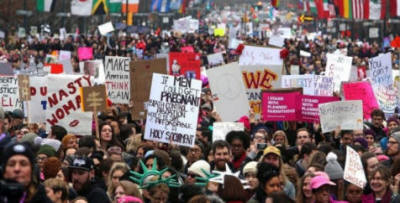
The Great Smoky Mountain Journal
Source: Fox News
Posted: Tuesday, January 01, 2019 02:23 PM
Woman's March To Protest One Year Anniversary Of President Trump's Inauguration
Marches are slated to take place in hundreds of cities both in the U.S. and beyond on Saturday. Thousands of people in New York alone have already signed up and as of Friday morning, nearly 85,000 people had registered to march in the state, according to The New York Times.
The protests this year go beyond just fighting for women’s rights in general, though that is still a primary focus. Indeed, according to the Women’s March website, the organization's platform has expanded to include immigrant, worker and disability rights, and environmental justice, among other things.
Additionally, the national Women's March organization is holding an event called “Power to the Polls” in Las Vegas, a rally that will focus on voter registration and electing more women to public office.
Ahead of the Women’s March events this weekend, here’s what you need to know.
What is it?
The Women’s March, which was first held on Jan. 21, 2017, was a response to Trump’s White House win. Thousands of women in Washington, D.C. and in cities across the U.S. and world used the day to advocate for women and human rights issues, which protesters argued would face adversity under the new administration.
The idea was first sparked by a Hawaii retiree named Teresa Shook, who took to Facebook just hours after Trump’s election. She asked a few friends via the social media platform to march on Washington with her in protest.
Bob Bland, a New York fashion designer who is now one of the organization’s national co-chairs, joined the call to action with her own message: “Who wants to join me?!?” she asked.
And with that, the Women’s March was born, soon to become the largest coordinated protest in the country’s history, according to the organization’s website. Additionally, the march in Washington in 2017 was about three times the size of the crowd at Trump’s inauguration, crowd scientists said at the time.
Other national co-chairs include Linda Sarsour, Tamika Mallory and Carmen Perez, among others.
How is this year different than last year?
Instead of another march on Washington, the national organization is hosting an event called “Power to the Polls” in Las Vegas on Sunday. This year’s event, which was inspired by the upcoming midterm elections, will focus on voter registration and inspiring more women to run for public office.
This means that any march this year will be hosted by either an affiliated or unaffiliated chapter of the Women’s March organization, not the national organization itself, according to a disclaimer.
The organization chose Nevada because the state has “recent experience with some of the most pressing issues facing women in our nation today, from gun violence to politicians accused of sexual assault,” organizers said.
According to Bland: "It was more important for us to create an event somewhere strategic to reflect the work that needed to be done in 2018. And Nevada is an example of a battleground state that went for Hillary Clinton and went blue in 2016 for the first time,” she told NPR.
"There are a record number of women running for local office and then also for state and governorship and there are competitive Senate races. We want to uplift that local work on a national scale on Jan 21," Bland added.
The event will be held in the Sam Boyd Stadium in Las Vegas.
Who’s speaking this year?
In addition to the Women’s March co-chairs, Cecile Richards, president of Planned Parenthood; Sen. Catherine Cortez Masto, D-Nev.; Rep. John Lewis, D-Ga.; Rep. Sheila Jackson Lee, D-Texas; Alicia Garza, co-founder of Black Lives Matter and actress Marisa Tomei are slated to speak. A full list of expected speakers can be found here.
Organizers for the Women’s March did not respond to Fox News’ request for additional comment on this weekend's events.
The Associated Press contributed to this report.

